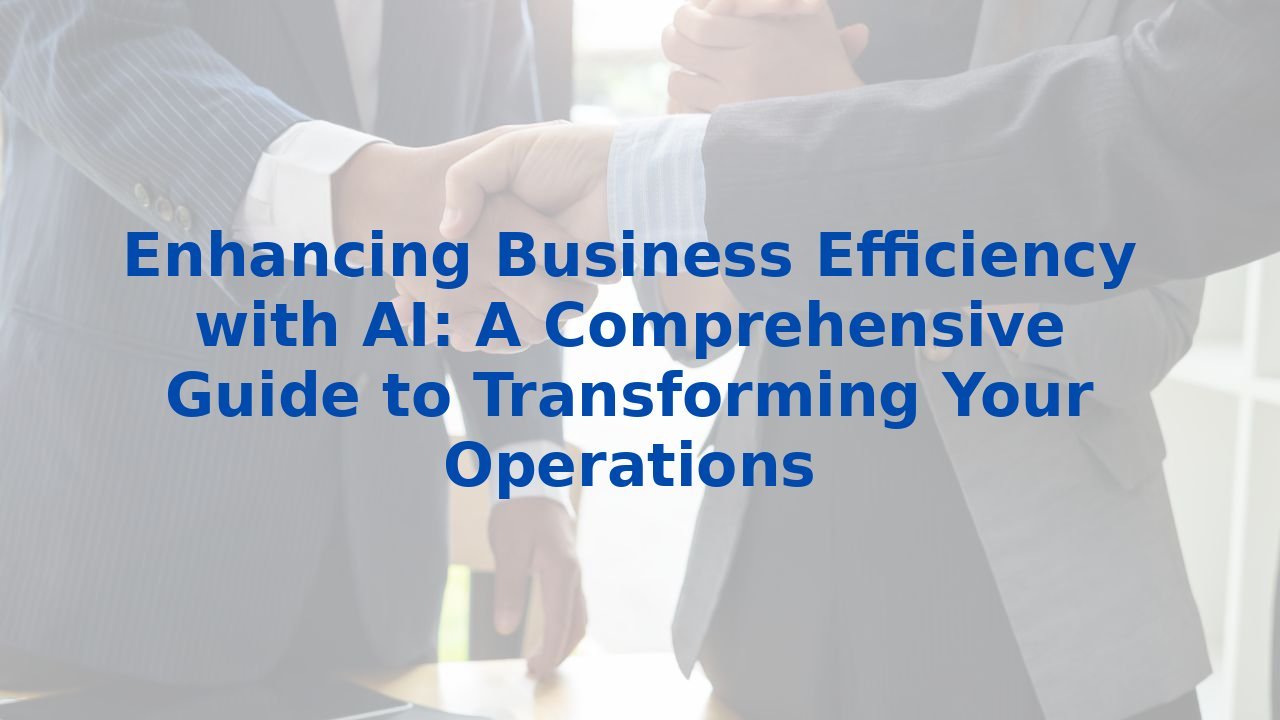Enhancing Business Efficiency with AI: A Comprehensive Guide to Transforming Your Operations
Enhancing Business Efficiency with AI: A Comprehensive Guide to Transforming Your Operations
Introduction
In the modern business landscape, the quest for operational efficiency is relentless. Organizations are increasingly leaning towards artificial intelligence (AI) as a transformative tool. AI’s unique capabilities allow businesses to automate tasks, optimize decision-making, and refine processes—ultimately elevating productivity and competitiveness. In this exploration, we will unpack how AI can be effectively integrated into key business processes while emphasizing its role in enhancing efficiency, safety, and reliability.
1. Increasing Efficiency
The hallmark of AI is its prowess in automating both repetitive and mundane tasks, which liberates human resources to engage in higher-level strategic initiatives. Here are some remarkable ways AI can supercharge efficiency:
Automating Routine Tasks:
By deploying AI-powered bots, organizations can revolutionize workflows associated with data entry, invoice processing, and appointment scheduling. As a result, the human error typical in manual operations is greatly minimized. This acceleration of workflows enables employees to channel their skills toward more complex and enriching tasks.
Process Optimization:
AI can act as a keen observer of workflows, diagnosing bottlenecks, redundancies, and inefficiencies. Through this analysis, businesses are empowered to reconfigure processes, automate labor-intensive tasks, and allocate resources more effectively—maximizing overall productivity.
Enhanced Customer Service:
Imagine a scenario where a significant chunk of customer inquiries can be efficiently managed by AI-driven chatbots. Not only does this relieve call center agents from routine questions, but it also allows them to focus on more nuanced customer concerns, refining the overall customer experience.
2. Enhancing Safety
AI is also a powerful ally in promoting workplace safety, tapping into its potential in various ways:
Automating Hazardous Tasks:
AI can take over tasks that involve risk or demand high precision. By automating these actions, organizations drastically reduce the odds of human error. Furthermore, AI's ability to monitor employee health and track fatigue can foster a safer working environment.
Predictive Maintenance:
In sectors like manufacturing, AI has the capacity to foresee equipment failures before they materialize, facilitating proactive maintenance. This not only safeguards the integrity of operations but significantly mitigates potential accidents.
3. Improving Reliability
Reliability in business operations is paramount, and AI excels in enhancing this aspect:
Data Accuracy:
With AI’s precision in data management, businesses can ensure high levels of accuracy in administrative tasks. This is especially relevant in manufacturing, where AI can automate complex procedures and discern patterns, leading to more dependable machinery and processes.
Predictive Analytics:
AI’s ability to scrutinize massive datasets equips organizations with actionable insights. This data-driven foresight enables companies to predict delivery timelines accurately, forecast supply chain disruptions, and troubleshoot operational bottlenecks. Consequently, the reliability of supply chains and overall operations is dramatically improved.
Benefits of Training Employees for AI
Despite AI's remarkable capabilities, the human element remains indispensable. Investing in employee training specific to AI usage can yield profound benefits:
Skill Development:
When employees receive comprehensive training, they become well-versed in the functionalities and limitations of AI tools. This understanding cultivates a skill set that narrows performance gaps among team members, promoting productivity and job satisfaction.
Adaptability:
Organizations with AI-trained employees cultivate an agile workforce—one that is quick to adapt to technological advancements. In an era of rapid change, maintaining this adaptability is essential for sustained growth and competitiveness.
Conclusion
Artificial intelligence stands out as a catalyst for enhancing business efficiency, safety, and reliability. By automating tasks, optimizing processes, and enhancing decision-making, AI can significantly boost organizational productivity. However, for the full spectrum of benefits to be realized, fostering a culture of AI literacy through employee training is just as vital. When organizations harness the power of AI in conjunction with an adept workforce, they open the doors to a future defined not just by efficiency, but by innovation and growth.



